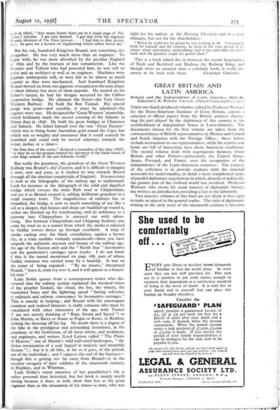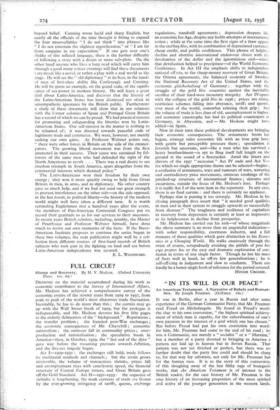Britain and the Independence of Latin America, 1812-30. Edited by
C. K. Webster. Two vols. (Oxford University Press. 50s.)
GREAT BRITAIN AND LATIN AMERICA
Britain and the Independence of Latin America, 1812-30. Edited by C. K. Webster. Two vols. (Oxford University Press. 50s.) THESE two finely produced volumes, edited by Professor Webster for the Ibero-American Institute of Great Britain, contain a selection of official papers from the British archives illustra- ting the part played by the diplomacy of this country in the establishment of independent States in Latin-America. The documents chosen for the first volume are taken from the correspondence of British representatives in Mexico and Central and South America with the Foreign Office ; these letters include instructions to our representatives, while the reports sent home are full of interesting facts about American conditions. The second volume deals with negotiations between Great Britain and other Powers—particularly the United States, Spain, Portugal, and France, over the recognition of the independence of the Latin-American countries. The purpose of the collection is to provide students with the material necessary for understanding in detail a most complicated series of parallel diplomatic negotiations in which, directly or indirectly, the greater part of the civilised world was involved. Professor Webster, who shows his usual mastery of diplomatic history, has written an introduction providing a key to the labyrinth.
Two massive volumes of this kind are not likely at first sight to make an appeal to the general reader. The style of diplomatic writing in the early years of the nineteenth century is tiresome beyond belief. Canning wrote lucid and sharp English, but nearly all the officials of the time thought it fitting to expand the four monosyllables " I do not think " into phrases like " I do not entertain the slightest apprehension," or " I am far from sanguine in my expectation." If one gets over one's dislike of this inflated language, there is the further 'difficulty of following a story with a dozen or more sub-plots. On the other hand anyone who liken a long read which will carry him through a good many winter evenings will find these documents very much like a novel, or rather a play with a real world as the stage. He will see the " old diplomacy " at its best, in the hands of men of first-class ability like Castlereagh and Canning. He will be given an example, on the grand scale, of the signifi- cance of sea-power in modern history. He will learn a great deal about Latin-America, and discover that the history of the Latin-American States has been dismissed too often in unsympathetic ignorance by the British public. Furthermore a study of these documents will show that in our relations with the former colonies of Spain and Portugal Great Britain has a record of which we can be proud. We had practical reasons for promoting and safeguarding the liberties won by Latin- American States. Our self-interest in the matter is nothing to be ashamed of; it was directed towards peaceful ends of legitimate trade and commerce. We were, however, not merely seeking our own gains. As Professor Webster points out, " there were other forces in Britain on the side of the emanci- pators. The growing liberal movement was from the first interested in their success. Their cause was sustained by fol- lowers of the same men who had defended the right of the North Americans to revolt . . . There was a real desire to see freedom triumph in South America, apart altogether from the commercial interests which dictated policy."
The Latin-Americans won their freedom by their own energy ; they won it more quickly owing to help from Great Britain in men, in arms, and in diplomacy. No other country gave so much help, and if we had not used our great strength to prevent interference on the other side—on the side opposed, in the last resort, to political liberty—the history of the modern world might well have taken a different turn. It is worth reminding Englishmen that a hundred years after the event, the members of Pan-American Centennial Congress put on record their gratitude to us for our services to their ancestors. In recent years British scholars, including, notably, the Master of Peterhouse and Professor Webster himself, have done much to revive our own memories of the facts. If the Ibero- American Institute proposes to continue the series begun in these two volumes, the next publication might well be a col- lection from different sources of first-hand records of British subjects who took part in the fighting on land and sea before Latin-American independence was secured.
E. L. WOODWARD.







































 Previous page
Previous page